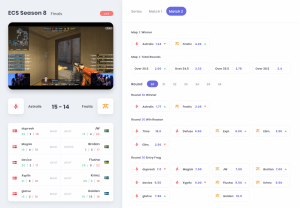As the world faced the coronavirus pandemic, esports betting companies and gambling service providers were forced to adapt to the new order of things.
Though the rising esports betting market is estimated to reach a global value of over $13bn (~£9.5bn) by 2025, it suffered a big hit due to the halt of large-scale events. Usually attended by thousands, CS:GO tournament ESL One Rio Major was rescheduled twice before getting cancelled.
The same happened to Dota 2’s The International which not only had to be rescheduled due to the pandemic but was also relocated from Stockholm to Bucharest where the event was held without a live audience.

RELATED: Mapping competitive advantages in esports
Traditional sporting events across the world also had to be postponed or cancelled. Unlike esports, the sector didn’t have the luxury of changing to an online format.
As such, a shift started to occur in the esports betting landscape. Many betting enthusiasts turned to FIFA and due to the title’s reliability to traditional punters, the title rose in prominence.
To learn more about how betting companies can take advantage of the growing popularity of esports and specifically FIFA, Esports Insider spoke with Tomas Ericsson, VP of Odds at Abios.
The growing popularity of FIFA esports and betting
One of the biggest football events, the UEFA Euro 2020 took place in June, following a prolonged period of suspensions and cancellations that affected a multitude of sporting events.
As countless leagues were being postponed – or in some cases cancelled – Electronic Arts’ long-running video game franchise provided punters with the opportunity to still bet on the sport, albeit virtually.
Ericsson said: “The popularity of FIFA peaked during the pandemic when it acted as a filler-product for the thinning sports calendar. Although it doesn’t see the same level of growth post-pandemic, we still see strong demand for a betting product for FIFA.”
Nevertheless, it wasn’t just FIFA’s betting sector that had experienced growth. The title’s esports scene has undergone a period of development following the introduction of its new programme.

RELATED: FIFA and EA announce expanded FIFA 22 esports programme
More and more traditional football clubs such as Manchester United, are signing dedicated professional players. Meanwhile, well-known esports entities are also looking to move into the FIFA scene.
This was recently highlighted by Tom Leese of Hashtag United, becoming the first-ever professional FIFA player to command a ‘significant’ transfer fee following his move to EXCEL ESPORTS.
With numerous high stakes tournaments in the FIFA scene now being put in place, more betting opportunities have arisen.
“With its high pace, FIFA is well suited for an engaging live betting experience and attracts players with an interest in esports, as well as players with interest in traditional sports,” Ericsson added.
As such, Abios recently expanded its FIFA data services, ‘due to the increased customer demand’ and revealed that live and pregame data for tier-one, tier-two, and tier-three FIFA tournaments will now be obtainable through its services.
Connecting betting companies and audiences with esports data
“Esports, in general, is well suited for an engaging betting experience,” said Ericsson.
The esports ecosystem’s digital nature makes it easy to follow from anywhere in the world. Moreover, the scene offers many tournaments and events to engage fans, which in turn could make it more intriguing to bet on.
Nevertheless, Ericsson added that despite there being an increase in popularity and demand for esports betting, most products on the market are still ‘under-developed’.
He explained: “Our hypothesis is that the esports community has a higher demand on the quality of betting products and that there is a huge untapped market within this community.”
Abios offers rich data products, catering to the esports betting industry, including titles such as FIFA.

RELATED: Abios secures Fragleague data partnership
On top of the scouted data feeds that FIFA tournament organisers supply, Abios offers its own scouted feeds; player age services and lots of metadata and statistics about the players and teams.
Moreover, the company provides both odds and real-time video feeds, depending on the tournament organiser each time.
Ericsson further discussed Abios’s vision: “Our product range includes data, widgets and odds products. Our vision is to provide the most entertaining esports experience and we believe that all of our products complement each other in a perfect way to realise our vision.”
Comparing FIFA esports to traditional football betting
All of Abios’s models are built for specific game titles and are created for a larger scope than ‘just’ the quality of the odds.
As Ericsson put it, the company focuses on other engaging features such as cash-out, bet builders and important quality aspects like bet offer availability.
A well-designed model requires a deep knowledge of the current FIFA esports ecosystem, but also similar data and technology that is required in traditional sports betting.
Traditional football matches still require human scouts to collect data, although new technologies are set to change that and digitise many processes.
 RELATED: Abios expands FIFA data services
RELATED: Abios expands FIFA data services
On the other hand, esports is digital in nature which enables data collection straight from the game server. If a company is able to work with server data, it creates opportunities for quality improvements.
“Data is the life-blood of high-quality sports betting services as it enables a completely automated flow. Our proprietary solutions for integrating with a game server gives us data feeds with low latency, high resolution and high accuracy,” Ericsson explained.
Staying compliant with esports betting regulations
As esports rises in popularity, jurisdictions in the US – alongside regions such as Thailand and Ukraine – have started to recognise the sector as an official sport. As such, it was only a matter of time before esports betting regulations became more fleshed out.
Betting on minors participating in esports events is one of the issues that regulating bodies within the sector have been trying to solve.
Several countries, including Sweden, the UK, Spain and the US have even imposed bans on betting on games where minors participate or where the majority of the players in a game are minors.
Earlier this year, Abios launched a solution to help bookmakers and esports companies ensure compliance is maintained with player age legislations.
Ericsson said: “In certain jurisdictions, there are regulations against keeping markets open on matches where underage players are participating. Thus, Abios helps clients stay compliant by providing information on player ages and birthdays in order for sportsbooks to be able to keep their markets open with confidence.”
[primis_video widget=”5183″]
RELATED: The imminent need for safeguarding in esports
Abios’s solution accounts for when certain market types or payback schemes are not allowed. The company has built-in mechanisms into its product to make it easier for operators to stay compliant.
Match-fixing and integrity also pose a problem in esports betting, however, this is more common in lower-tier events.
Ericsson added: “It is obviously important for us to do all we can to minimise the risk and avoid offering the lowest tier of events or specific bet offers with integrity concerns.
“The main goal here is to protect the sport and not our margin, although margins are an important aspect.”
As the esports betting landscape grows and adapts to its audience’s needs, it’s only normal to expect more and more complex solutions.
Data-focused esports solutions have the potential to make bookmakers’ work easier. Moreover, it seems as though FIFA’s esports still has a place within the betting sector, so much so that data providers such as Abios are doubling down on greater solutions and offerings.
[maxbutton id=”11″ ]
